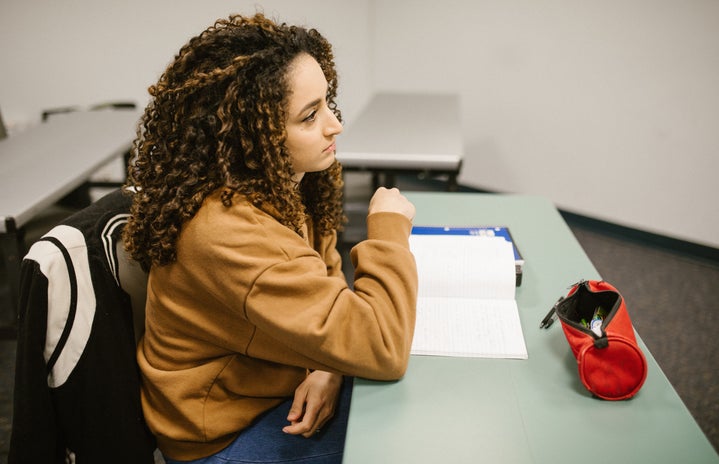I always wanted to touch on my experience being a first-generation college student, but this week was the pinnacle of this experience. I realized there was no better time than now to discuss this.
To provide some context for those who don’t know me, my mother is a Costa Rican immigrant, who obtained a visa and first came to Florida in her twenties. She worked as a nanny, and she later found a job in Pennsylvania in the house next to my father’s, which is how they met. My mother did not finish elementary school, as she came from a financially-underprivileged family, and began to work full-time at age eleven. Disclaimer: child-labor laws are much more clear and enforced in Costa Rica today. Seriously, she was born in a home with no electricity or running water. My mother moved hours away from her family to provide care as a nanny, despite still being a child herself, to send funds to support her family from afar. After her nanny gigs in the US throughout her twenties, she established her own cleaning business, which she still owns and runs today. Needless to say, she is an incredible inspiration to me. She is now a business and home owner, and legal citizen of the United States. Her success is entirely self-made and she came from essentially no material wealth. My mother will tell you, however, that she was always extremely blessed by God.
My father was born and raised in New Jersey. Although his family was certainly not wealthy by any means– my grandfather was a World War II veteran and worked as a mechanic both during and after the war– he lived a privileged life in comparison to my mother. He graduated from high school and went on to complete a semester at community college, before dropping out and establishing a landscaping business. He ran his business until 2014, when he had a severe hemorrhagic stroke that left him unable to work. Thankfully, my dad had a miraculous recovery and is still with us today.
In the ninth grade, a financial crisis occurred that left me without a college fund. The mere thought of applying to college seemed daunting; it loomed over me like a distant storm. With no funds to pay for higher education either– except the couple thousand dollars my mother was able to scrape together during the rest of my high school career– my aspiration to attend college seemed like a pinhole of light at the end of a long tunnel. I thought it would be impossible, and almost accepted that this would not be an opportunity in the cards I was dealt.
Obviously, I was wrong. I laugh now at how little faith I had, because attending IUP is an example of God’s power to me.
I applied to IUP not because I knew anything about the university, but because there was no application fee. I was accepted, and shocked to see several scholarship programs reach out to me through the university, including the Promising Scholars program. I additionally applied to and was accepted into the Cook Honors College. Both of these programs have not only financially aided me so I can attend IUP, but have given me resources and knowledge so that I am prepared to enter my career post-graduation.
Now, I am a junior nursing student in the midst of med-surg. I would be lying if I did not say this is the most challenging semester of college so far. For the first time in my college career, I failed an exam. Being the perfectionist I am, I was crushed. However, I tried to change my mentality from thinking I am a failure to this is an opportunity to better myself. I reflected on my study habits, figuring out what was working for me and what wasn’t. I adjusted accordingly, and also adapted healthier lifestyle habits, making sure I’m eating and sleeping. This can still be challenging when I’m feeling anxious and can’t sleep at night. So often, college students neglect our most basic needs when under academic and/or financial stress.
So, what does this have to do with being a first-generation college student? Well, I’m sure I can speak for the vast majority of us first-gen students when I say we feel immense pressure academically. After all, it is a huge accomplishment to be the first in our family to successfully pursue higher education. With that, however, comes a great sentiment of achieving this degree for our family and not simply for us as individuals. Oftentimes, we view academics from a financial perspective: maintaining a certain GPA in order to maintain our scholarships. Each grade, essentially, is money. This week, I told my brother, who started working right after graduating high school, how I felt like I’d be letting the entire family down if I did not earn my degree. He reminded me that I was confusing success with college–while higher education is a tool to succeed, it is not the only route. Besides, he told me, you can do anything you put your mind to– you’re like mom in that way. It brought tears to my eyes. My father, after expressing these concerns, reminded me that he is already beyond proud of me. And of course, my mother: she told me there is no doubt in her mind I can finish this program despite my failures.
I am extremely privileged to have attended a wonderful public high school and have the constant support from my family that I do. I recognize, however, that not every student has this, and that makes college even more challenging.
College is difficult as is. But for students whose parents can’t help them filing their FAFSA except for providing a signature, who have to search wide and far for every scholarship opportunity available, who stress about breaking generational cycles through their mere status as a college student– there exists a stress that seems inescapable. A stress that keeps me tossing and turning at night when I know I desperately need the rest to function at my best the next day.
This week was a wake-up call. These stressors cumulated and, instead of prioritizing my need to rest and relax, I pushed myself to the absolute limit. I spend hours on-end in an isolated cubicle at the library, trying to force information into my brain. I didn’t sleep as much as I should have. I skipped meals because studying seemed more important.
It came to a crashing halt Wednesday. I had to bring myself to a medical clinic because I got scared. I started experiencing chest pain, felt like I couldn’t catch my breath, and had severe stomach cramping. What was wrong with me?
Turns out, my heart was just fine. My stomach had an acid-reflux issue that was a direct result of stress, anxiety, and probably too much caffeine. My anxiety and stress manifested itself in other ways, too– I lashed out at my two best friends over simple miscommunication, when they have been nothing but supportive and concerned for my well being. Thankfully, they were extremely understanding. Quite frankly, I’m not sure I would have treated myself with the same grace they treated me with.
I realized, for both first-gen students and any college student, we must prioritize our rest, our mental health, and our overall well being. Yes, school is stressful and studying is important. But pushing yourself beyond your limits will only lead to burnout and create more problems.
Fellow first-gens: you are doing amazing. It may not feel like the work you do is ever enough, but I can assure you it is. You will earn the degree. You will get that job. You will land that interview. Your family may not have gotten the same educational opportunities you have, but they certainly have prepared you by instilling in you the values you have. The work ethic, the determination. You got this. And yes, you will break generational cycles. YOU. You are creating and leaving a legacy that will continue for generations to come.


